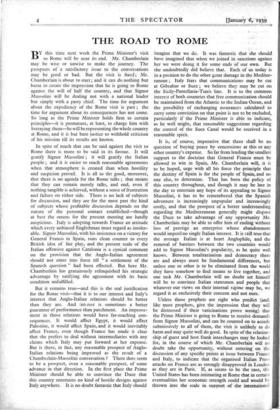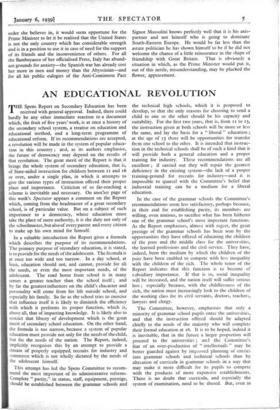THE ROAD TO ROME
BY this time next week the Prime Minister's visit to Rome will be near its end. Mr. Chamberlain may be wise or unwise to make the journey. The prospects of a satisfactory issue to the conversations may be good or bad. But the visit is fixed ; Mr. Chamberlain is about to start; and it can do nothing but harm to create the impression that he is going to Rome against the will of half the country, and that Signor Mussolini will be dealing not with a national leader but simply with a party chief. The time for argument about the expediency of the Rome visit is past ; the time for argument about its consequences has not come. So long as the Prime Minister holds firm to certain principles—it is premature, at least, to charge him with betraying them—he will be representing the whole country at Rome, and it is but bare justice to withhold criticism of his mission till its results are known.
In spite of much that can be said against the visit to Rome there is more to be said in its favour. It will gratify Signor Mussolini ; it will gratify the Italian people ; and it is easier to reach reasonable agreements when that atmosphere is created than when hostility and suspicion prevail. It is all to the good, moreover, that there is no agenda for the Rome talks ; that means that they can remain merely talks, and end, even if nothing tangible is achieved, without a sense of frustration and failure on either side. There is no lack of subjects for discussion, and they are for the most part the kind of subjects whose profitable discussion depends on the nature of the personal contact established—though at best the omens for the present meeting are hardly auspicious. Italy is adopting towards France an attitude which every unbiased Englishman must regard as intoler- able. Signor Mussolini, with his insistence on a victory for General Franco in Spain, runs clean counter to every British idea of fair play, and the present scale of the Italian offensive against Catalonia is a cynical comment on the provision that the Anglo-Italian agreement should not enter into force till " a settlement of the Spanish question " had been effected. But here Mr. Chamberlain has gratuitously relinquished his strategic advantage by ratifying the agreement with its basic condition unfulfilled.
But it remains true—and this is the real justification for the Rome visit—that it is to our interest and Italy's interest that Anglo-Italian relations should be better than they are. And interest is sometimes a better guarantee of performance than parchment. An improve- ment in those relations would have far-reaching con- sequences. It would affect Egypt, it would affect Palestine, it would affect Spain, and it would inevitably affect France, even though France has made it clear that she prefers to deal without intermediaries with any claims which Italy may put forward at her expense. But is there, in fact, any reasonable prospect of Anglo-, Italian relations being improved as the result of a Chamberlain-Mussolini conversation ? There does seem to be a prospect, even a reasonable prospect, of some advance in that direction. In the first place the Prime Minister should be able to convince the Duce that this country entertains no kind of hostile designs against Italy anywhere. It is no doubt fantastic that Italy should imagine that we do. It was fantastic that she should have imagined that when we joined in sanctions against her we were doing it for some ends of our own. But she undoubtedly did believe that. Each of us today is in a position to do the other great damage in the Mediter- ranean ; Italy fears that communications may be cut at Gibraltar or Suez ; we believe they may be cut on the Sicily-Pantellaria-Tunis line. It is to the common interest of both countries that free communication should be maintained from the Atlantic to the Indian Ocean, and the possibility of exchanging assurances calculated to carry some conviction on that point is not to be excluded, particularly if the Prime Minister is able to indicate, as he well might, that reasonable suggestions regarding the control of the Suez Canal would be received in a reasonable spirit.
It is, of course, imperative that there shall be no question of buying peace by concessions at this or any other country's expense. So far from lending the smallest support to the doctrine that General Franco must be allowed to win in Spain, Mr. Chamberlain will, it is to be hoped, urge with all his force the principle that the destiny of Spain is for the people of Spain, and no one else, to determine. That has been the policy of this country throughout, and lough it may be late in the day to entertain any hope of its appealing to Signor Mussolini, it has to be remembered that the Spanish adventure is increasingly unpopular and increasingly costly, and that the prospect of a better understanding regarding the Mediterranean generally might dispose the Duce to take advantage of any opportunity Mr. Chamberlain may be able to offer him of ending without loss of prestige an enterprise whose abandonment would imperil no single Italian interest. It is still true that the average Italian is at heart Anglophile, and the removal of barriers between the two countries would add to Signor Mussolini's popularity, as he quite well knows. Between totalitarianism and democracy there are and always must be fundamental differences, but unless one or other is to be eliminated from the world they have somehow to find means to live together, and one task Mr. Chamberlain will no doubt set himself will be to convince Italian statesmen and people that whatever our views on their internal regime may be, we regard it as exclusively their concern and not ours.
Unless those prophets are right who predict (and, like most prophets, give the impression that they will be distressed if their vaticinations proye wrong) that the Prime Minister is going to Rome to receive demands from Signor Mussolini, and can be counted on to accede submissively to all of them, the visit is unlikely to do harm and may quite well do good. In spite of the relation- ship of guest and host frank interchanges may be looked for, in the course of which Mr. Chamberlain will no doubt take the opportunity, without entering on the discussion of any specific pOints at issue between France and and Italy, to indicate that the organised Italian Press attacks on France are as strongly disapproved in London as they are in Paris.- If, as seems to be the case, the United States has been intimating at Rome that in certain eventualities her economic strength could and would be thrown into the scale in support -of the international order she believes in, it would seem opportune for the Prime Minister to let it be realised that the United States is not the only country which has considerable strength and is in a position to use it in case of need for the support of its friends and the inconvenience of others. For all the flamboyance of her officialised Press, Italy has abund- ant grounds for anxiety—the Spanish war has already cost her more in men and money than the Abyssinian—and for all his public eulogies of the Anti-Comintern Pact Signor Mussolini knows perfectly well that it is his axis- partner and not himself who is going to dominate South-Eastern Europe. He would be far less than the astute politician he has shown himself to be if he did not welcome the chance of a little reinsurance in the shape of friendship with Great Britain. That is obviously a situation in which, as the Prime Minister would put it, out of this nettle, misunderstanding, may be plucked the flower, appeasement.











































 Previous page
Previous page